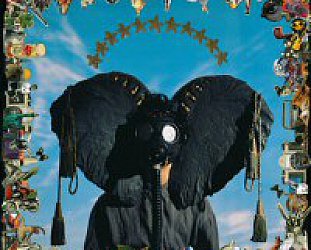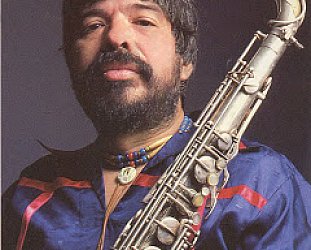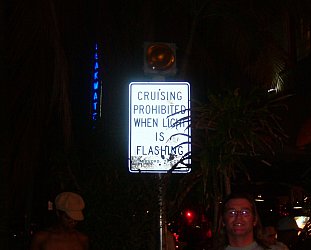Graham Reid | | 9 min read

For a few smoke-filled seconds Karl Wallinger is difficult to see in this small airless room three floors up in suburban London, W10. Then through the haze of his cigarette smoke he emerges like some satiated Cheshire cat. Grinning.
This is the day Wallinger has set aside to talk some about the new World Party album Bang!, and as chief Party member who writes, sings, arranges and most often plays everything, he can, with justification, adopt the stroppy attitude of some cheeky fourth former from the bottom class who’s sharp and knows it.
But he’s a likeable smart alec whose music has assimilated the essence of Britpop. His exceptional and essential Goodbye Jumbo of three years ago was, in the words of Mat Smith in a recent Melody Maker, “a record so intimate you could almost feel the warmth of it on the back of your neck.”
But if the lustrous, Beatles-inspired melodies and clever lyrical referencing of Goodbye Jumbo allowed it to be called “the first important album of the decade” (Smith again) and acknowledged as best album of 1990 by Q magazine, then Bang! “explores its own terrain without the walking frame of the 60s,” according to Wallinger.
He grins knowingly.
He’s on to his stuff . . . . yours too if you were going to try to nail him as just another Britpop Beatles‘ copyist . . . and delivers his bit in landslides of upper-crust polysyllables and parody accents which slip from Prince Charles (“my dear boy”) to Mick Jagger’s mock-Cockney.
And although he can seem smart to the point of arrogance, he possesses a keen engaging wit, believes musicians “take themselves far too seriously, dear boy” and says he is quite content to simply get on and do World Party whether it gets any attention or not.
“As long as we live to fight another day,” says Prince Charles using the royal plural, “and we can buy another reel of tape for the studio, then it doesn’t really matter if the world gets it or not. It’s just a bunch of songs, really,” he says with a disingenuous grin.
But it’s more than that and he knows it.
So does Jane Berk, vice-president of marketing at Chrysalis, his record company.
“Most people who are into World Party are passionate about the band,” she observes astutely, “and the feeling is that they are bigger than they really are.”
There’s the Party problem.
Goodbye Jumbo, for all its acclaim from Auckland to the Orkneys, didn’t sell to expectation. Another critical favourite passed over at the time in favour of Mariah Carey and the Carpenters’ Greatest Hits.
That puts Wallinger in this room on this day sipping tea, scratching an unshaven face and resolutely elusive behind smoke, shades and a grin.
“I know what I have to do and it’s done with a measure of humour and acceptance. I actually enjoy disseminating World Party information . . . ”
“Which we don’t get in New Zealand, of course.
“My dear boy, you don’t have to be on the other side of the world not to get it,” says Prince Charles. “You could stay here and be totally devoid of it.”
Despite that, however, Wallinger is important enough in pop to have his lyrics quoted back at him, score rave reviews for shows on his present tour with a newly formed band (“we’re a beat group pretending to be the Beatles on one side and a hip-hop act with a space station on the other side”) and on Bang! offers some of the cleverest music of his generation.
Again.
When Goodbye Jumbo appeared and captured that small audience of critics and cognoscenti, there were inevitable questions about where such a fully formed talent had sprung form. Not just anyone could amalgamate Lennonsque ballads and nod towards Iggy Pop on the grunty Way Down Now (“Inside my TV eye...”) or unselfconsciously toss off lines from Supertramp(!).
Or get away a magnificent Chess Studios/Stones-styled anti-Thatcher rant on You’re Invited to a Party, which he buried on a CD single.
This was no vapid Electric Light Orchestra-style Beatles pastiche. It was a world party. And you were invited.
And just as he can slide into various voices in conversation, so he can adopt the right voice for his musical vehicles from Jagger to Macca to Lennon to . . . .
To always sounding like himself, in fact.
“Yes, an appropriate voice does seem to come out, doesn’t it?” he says, firing up another cigarette. “I don’t have specific voice and certainly don’t think, ‘Oh, I’ll write one like this.’ Afterwards I do get disappointed if people can’t hear I’ve actually written something as honestly created as anything else. But growing up on the Beatles, Beach Boys and Stones, it is highly likely you’ll find some reference to their styles.
“And sometimes there’s just a general playfulness about it – and in-jokes. I like toying with cultural references and making them amusing. Music is so serious today. Too much so. It could be more fun. And I’m not talking about having to be wacky like Madness, because that’s so simplistic and like musical slapstick.
“I like subtlety and can’t see why music can’t be witty or whimsical.”
Yet to be all that in the way Wallinger can be – a line from Mr Postman tossed into When the Rainbow Comes on Jumbo, the trippy Anglopop of Kingdom Come on the new album – is to know the history and have lived it.
Born in North Wales around the corner from Liverpool, 35-year-old Wallinger was just in time to catch the Merseybeat sound from his older sisters. He bought his first record (Somebody Help Me by the Spencer Davis Group) and fell into pop dreams.
By the early 70s he was experimenting with home tapes playing with a band called Pax (some of whom went to become the Alarm), then moved to London to work at Northern Songs, publishers of the Beatles.
He started as a royalties analysis clerk but was discovered playing piano at lunchtime and taken on as an in-house songwriter. Ironically, he couldn’t write hits, so moved off to become musical director of the Rocky Horror Show in the West End. He passed through a couple of avant-garde and Britfunk bands (his listening encompassing Captain Beefheart and the Average White Band along the way), then answered an ad in the music press and found himself in the Waterboys for two albums.
He quit to form World party in ’85.
Signed to Ensign, he crafted the first World Party album, Private Revolution, almost single-handed, and although it sprang the hit Ship of Fools, he remained almost the exclusive preserve of critics.
Goodbye Jumbo in 1990 was the album widely expected to change that. It didn’t. But it allowed Wallinger the freedom he had longed for.
“On that album I was able to do things I’d wanted to do all my life to recapture that excitement of my first decade in music. A song like Message in the Box [a hook-laden piece of shimmering Anglopop] couldn’t have cropped up on Private Revolution. And it isn’t on Bang! because now I have gone through that gate and there is new terrain for me to explore without having to reference the co-ordinates quite so precisely.
“Maybe people only enjoyed Goodbye Jumbo because it arrived at a particular time when there looked like there was going to be a 60s revival. And maybe they won’t like Bang! because there’s a 70s revival at the moment . . . and Bang! isn’t like either of those things.
Bang! is certainly a shift away from the pristine, self-contained pop of Jumbo. Wallinger still has an intravenous drip of pop sensibilities: Is It Like Today? chimes across guitars and piano with Wallinger’s ambient vocals riding the gentle hooks; Hollywood shunts and soars over a chugging synth.
But he also moves into coy, Prince-like funk in places which reminds you that Prince is a World Party fan and Wallinger’s manager now, Steve Fargnoli, did the same job with the little one, so is used to working with solitary megalomaniacs.
Radio Days is a sampled piece with a musical backdrop like the Beatles’ Revolution 9 with a tune (“I’m one who can listen to Revolution 9 as a pleasurable experience”) and “the Give It All Away reprise is just a groove.”
In its own way, Bang! with its smooth, accessible pop sensibilities, is as unfashionable as Goodbye Jumbo . . . and Wallinger s says he couldn’t care less.
“No, we haven’t come from Seattle, we’re not a group of identifiable faces and not a lot of people walk around dressed like us,” he says through that thick, smug grin.
“I am non-aligned and non-affiliated and have never felt part of any particular thing, nor have I been mentioned in the same breath as anyone. I don’t want to sing in a gruff voice over moronic music like death metal, thrash metal or metal metal . . . or whatever it’s called. I’m not folkrockpoppyboom, either.
“We’re just us. It’s just a bunch of songs.”
Yet Wallinger is disingenuous in his self deprecation. His work is crafted, and crafty. And despite public indifference to Goodbye Jumbo, the immediate success of Bang! in Britain – it went to number one the week after it debuted at number two on the charts – suggests Wallinger has at last found his constituency. It was almost as if pop culture was apologising for its earlier oversight.
Because if Wallinger can do anything well, it is craft a memorable pop tune . . . and he got there by analysis. On the CD single of the earlier Message in the Box, there was a letter-perfect version of Lennon’s Beatles-period Happiness Is a Warm Gun.
“Well, it isn’t actually letter perfect. It has totally absorbed the original but it isn’t note for note.”
Well, almost.
“Yeah, it’s pretty close.”
Uh-huh.
“All right, it’s not that far away. It’s certainly completely recognisable in your memory of that song.”
Not to say photocopy.
But taking it apart allowed him to “understand it, as with other songs, and in what ethos they were written.” And Wallinger’s respect for the great Tradition of British Pop is map-reference by the Beatles.
Ask him about the sampling on Radio Days and he’ll tell you how he was using Ronald Reagan’s voice back in ’77 but “Revolution 9 was the biggest bunch of samples ever put together and the only thing it hasn’t got is a hip-hop beat.”
Ask him why he doesn’t, as Elvis Costello has for Wendy James, write for others and he’ll say he’s already got one record company on his back, who needs another? But anyway, he’d rather let others pick up on songs he’s already written – “like Shirley Bassey covering [George Harrison’s] Something.”
And he has included another Beatles cover on the CD single of Is It Like Today? A slow reassessment of the jangle pop of World Without Love.
A bit of an obsession here, Karl?
“No, I heard of this really great group and everyone knows they’re great . . . but its 1993 now and we’ve got the progeny. Dance techno. But I still think that [Beatles] music says what it is like to be a human being and there’s an element of happiness and conviviality about it that I want to inform World Party music.
“But I didn’t want our music to be a retread for people who happen to live out some 60s lifestyle. We’re not part of some consumer ideal. I want our songs to be enjoyed, and appreciated in some serious analytical way with dissertations written. And I hope that people are free enough to hear things as they are and simply enjoy them.
“If they are looking for something fashionable, they’ll be disappointed.
“I don’t want to ingratiate myself with people half my age just because someone thinks I should be hip, “he says with an airy wave of cigarette smoke.
He laughs at his own recent listening: he loves the Cocteau Twins (“what the female sex – and I mean that physically – would sound like if it could sing”) and offers unsolicited opinion on the return of Duran Duran: “I like Simon Le Bon. He’s like someone who got up at a party to sing and couldn’t care less. But I wouldn’t look to him for the ultimate musical experience.”
But he confesses guiltily the last thing he listened to was . . .
“Abbey Road in my New York hotel room last week.”
And because he’s such an astute, cheeky and knowledgeable conversationalist (“New Zealand? Oh, Auckland, Wellington...?” he lets any serious talk about Bang! go by.
“Just a bunch of songs,” he says again, “and if you like them, you do. If you don’t . . . well, we won’t be here much longer.”
That would be a shame. Wallinger is intelligent, resolutely Green and political in his lyrics (Midnight Oil are dismissed for being bombastic and obvious) and his is pop with a purpose.
“Part of the fun in having that 15 minutes of fame is in seeing if there is anything you have to say and how you can couch it in particular terms.”
And if the 15 minutes is up?
He shrugs and grins again as if he couldn’t care less. He lowers the tinted glasses and what you see in there is a man who probably couldn’t care more.
After half an hour zoomed in close, the elusive smart alec and quite gifted Karl Wallinger is still no easier to see through the smoke he creates.
Footnote: Wallinger’s greatest success came from a most unexpected source: in 1999 Robbie Williams covered his She’s the One and it became a UK hit.







Meda - Jan 19, 2009
Well shed some light!! This made me smile, and I'm immersing in World Party Music cuz it just feels so good, I'm groovin'! I've been in a bit of a musical rut, well maybe not rut, but a level of loyalty to one sound that I was not growing like that, but I AM growing, so this is so cool to have a new soundtrack to my journey, peace be the journey friend!!-xoxo-Meda
Savepost a comment